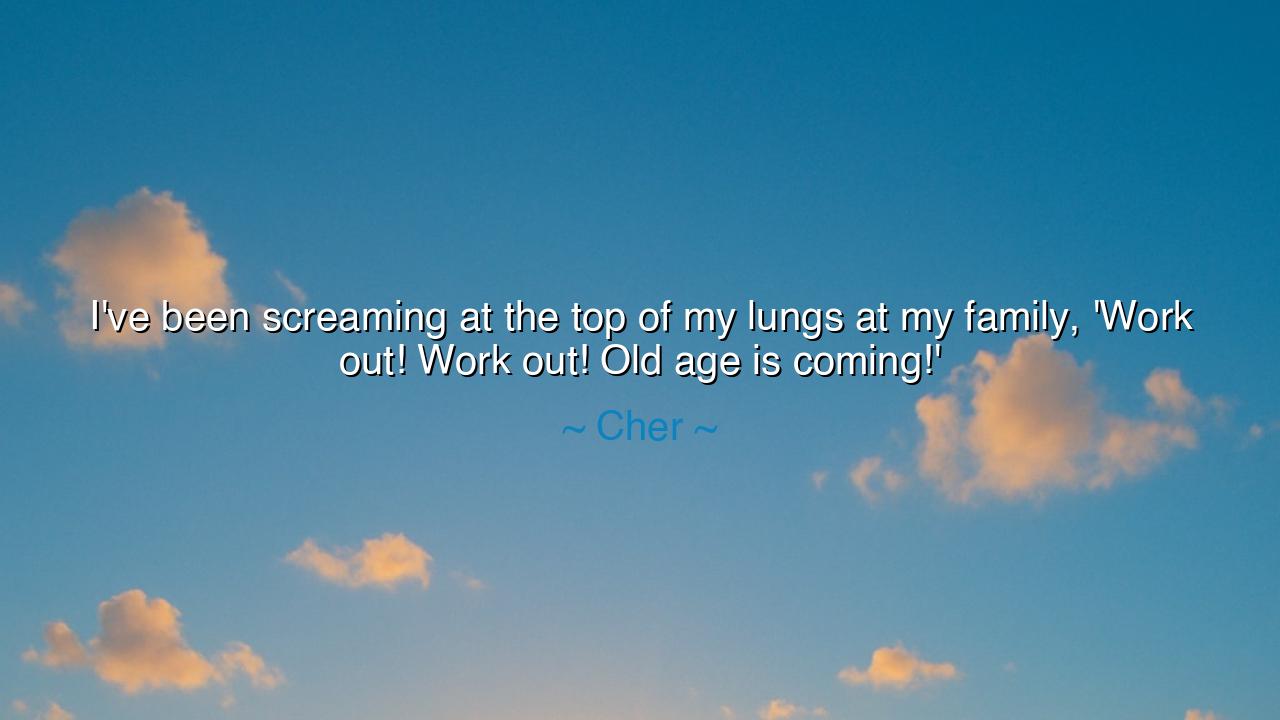
I've been screaming at the top of my lungs at my family, 'Work
I've been screaming at the top of my lungs at my family, 'Work out! Work out! Old age is coming!'






In the journey of life, where time flows like a river and youth fades into old age, there are few calls more urgent than the one to remain strong, to maintain our vitality, and to care for the vessel that carries us through the years. The iconic Cher, in her vibrant reflection, declares: "I've been screaming at the top of my lungs at my family, 'Work out! Work out! Old age is coming!" These words, filled with passion and concern, are not just about the physical act of exercise; they are a powerful reminder of the need to prepare for the inevitable passage of time, to face the challenges of aging with strength and resilience.
What, then, does Cher mean by the call to work out, especially as old age approaches? It is a call to action, a demand to embrace the body’s potential, even as the years advance. Exercise is not just a tool for youth—it is a foundation for the life we lead as we grow older. Cher’s words carry the urgency of someone who understands that age does not come gently; it demands attention, discipline, and effort. The workout she speaks of is not just about physical appearance, but about maintaining health, about staying strong, and about facing the challenges of aging with vigor rather than passivity. Old age may come, but it need not arrive as a sudden collapse of strength and vitality; it can, instead, be a phase marked by continued resilience.
The ancients understood this connection between the body and life. The Greeks, particularly the Spartans, saw physical strength as not only vital for warfare but for life itself. For them, the discipline of maintaining one’s body was a moral imperative, an act of honor and courage. Spartan warriors trained their bodies to endure, to overcome, and to remain unstoppable, even in the face of the ravages of time. They did not see aging as an inevitable decline, but as a call to adapt and continue to push their limits. Just as they maintained their strength for battle, so too must we maintain our strength for the challenges that life brings with each passing year.
Consider the example of Socrates, the great philosopher of ancient Greece, who, despite his advancing years, continued to engage in vigorous debate and intellectual activity. Socrates believed that the mind and body were inseparable, and that one could not hope to achieve wisdom without maintaining the health of the body. As he aged, he did not retreat into the comforts of old age, but instead, he sought to live each day with purpose and physical engagement. His commitment to discipline, in both mind and body, is a lesson for us all. Like Cher, Socrates understood that aging, though inevitable, is not something to surrender to passively; rather, it is something to engage with, to face head-on, and to confront with the strength we have cultivated.
The urgency in Cher’s call—“work out! work out!” echoes the wisdom of those who came before her. It is a reminder that in the face of old age, strength is not merely a physical trait but a state of mind. Old age is not a time to withdraw from life, but a time to adapt, to reinvent oneself, and to embrace the changes that come. As we grow older, the workout is not just about maintaining the body’s strength but about maintaining the will to live fully, to engage deeply, and to resist the forces that would diminish our vitality. Like the Stoics of ancient Rome, who believed in cultivating inner strength through self-discipline, we too must recognize that aging is a battle—one that we can face with the same courage we showed in youth.
There is also a clear lesson in Cher’s words for us all: we are responsible for the future of our own well-being. The effort to stay healthy is not an external imposition but a personal choice—one that begins long before old age arrives at the door. The workout is not just about doing it today, but about creating habits that will sustain us through the years ahead. It is a commitment to ourselves, a promise that we will not merely let life pass us by, but that we will engage with it actively, each and every day.
The lesson, then, is one of empowerment and discipline. Let us take Cher’s urgency to heart and approach our aging process not with resignation but with action. Let us understand that the effort we put into maintaining our bodies, through physical activity or mental engagement, is a gift we give to ourselves. Aging is not something that must diminish us—it can, instead, be the time when we redefine ourselves, when we adapt to new challenges and continue to grow. In this, we can find the true power of aging: not in shrinking, but in expanding our capacity for life.






AAdministratorAdministrator
Welcome, honored guests. Please leave a comment, we will respond soon